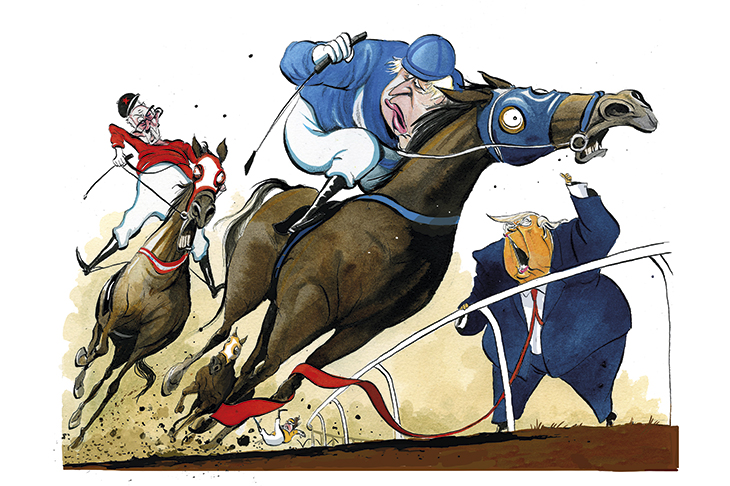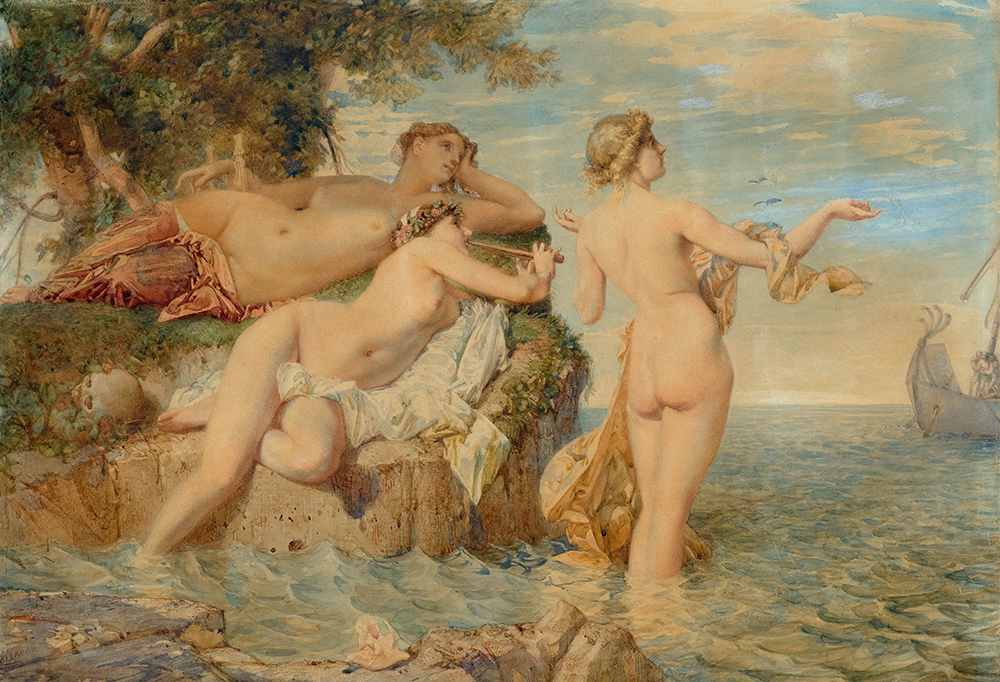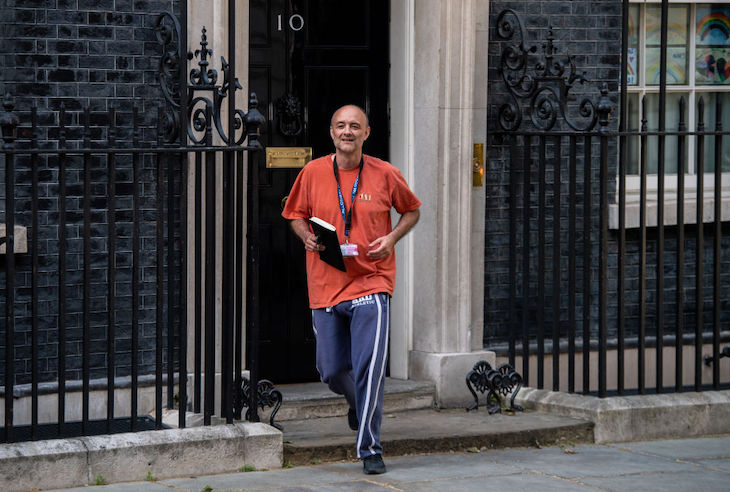Only once in the post-war era has a British political party won a fourth term in office, but that is what the Conservative party are attempting to do in this election. It’s a tall order, but Boris Johnson has a plan: to make it clear that his is a new government — offering change, not simply more of the same.
‘I have great respect for my predecessors, it goes without saying, great respect, but this is a new government and we have a new agenda and it will be a different agenda,’ he insists, when we meet in an aircraft hangar in the marginal seat of Norwich North. ‘This is not a continuity government. This is a new government, we have a very different approach. If we can get in with a working majority, we will have a transformative agenda for the country. That’s what I want to see and I genuinely, genuinely want to see the talents of all this country. I do think there is an injustice at the moment that can be tackled and we have the means of doing it.’
Throughout the election campaign, the British prime minister has had some success in presenting himself as the new face of a transformed party. At times it has seemed that Jo Swinson, the Liberal Democrat leader, has taken more flak for the coalition years than the Tory leader. When it comes to those coalition cuts and the last nine years of Tory austerity, Johnson goes further, and says it is not what he would have done. ‘I remember having conversations with colleagues in the government that came in in 2010 saying I thought austerity was just not the right way forward for the UK.’ Not something he has said in public before. ‘I’ve always thought: why use the language of Stafford Cripps?’ he asks, referring to the Labour chancellor who chose to continue wartime rationing. ‘Didn’t he drink his own urine? Not an approach that’s commended itself to me!’
If likening austerity to drinking one’s own pee was not distancing enough, Johnson has more to say. On crime, national security and tax cuts he offers traditional conservatism. But, he says, ‘we also are going to be very different in our overall view on how to unleash the potential of this country.’ His plan of action all comes back to his reading of the referendum result. His view is that what swung it for Leave was regional inequality. ‘After 45, almost 50 years of EU membership, people were feeling that parts of the UK were simply being ignored. The model of our society, the model of our economy that the EU membership seemed to go along with was basically leaving people behind. What I want to do — and that’s why I find this whole thing so frustrating — is get on with a program of leveling up. A program of uniting the country. I want to see change. I want to see this country very different in ten, 15 years’ time. I want to see that change in regions and towns that have been neglected.’ The remedy, he says, is ‘infrastructure and education and technology.’
Given that Johnson has never met a bridge that he doesn’t like, this emphasis on infrastructure is unsurprising. It’s also the backbone of his new economic policy: to borrow more, as long as interest rates are low and the cash is used to invest in infrastructure. It is clear that if he returns to No. 10 on December 13, the usual government rules on the funding of such projects will be ripped up. Previous governments, he says, have taken too cold a view on which parts of Britain deserve investment. He promises a fresh approach.
‘The Treasury has basically looked at certain parts of the country and thought that they weren’t cash cows, from the point of view of delivering revenue,’ he says. ‘I take a different view. That this country is so underprovided for in brilliant infrastructure that you can make a good business case for many things.’
His voice at times shows the strain of time on the road — but he visibly enjoys campaigning in a way that Theresa May never did. The second world war aircraft hangar we’re in is part of the International Aviation Academy in Norfolk, which trains young people seeking a career in aviation industry. Like the late Queen Mother, he needs to be loved; and the enthusiasm of the young apprentices queuing for pictures with him at the end of his visit has clearly put him in a good mood even if it’s made him late. But he tries to shut down any question on whether he’s winning or not. All he will say is that he is involved in ‘daily hand to hand political discussion, debate with people around the country’.
Comments on urine-drinking aside, Johnson is at pains to say nothing that could throw things off course (he dodges a question on Huawei) or smack of complacency. When we ask about the fate of Jacob Rees-Mogg, confined to his constituency since making insensitive comments about the Grenfell fire, he dismisses any talk about his future team as ‘measuring the curtains’.
One thing Boris Johnson is more than happy talking about, however, is his central message: ‘Get Brexit done.’ Vote Conservative, he says, and his deal will be passed immediately; pointing out that every single Tory candidate has personally pledged to vote for it. It’s a message to Brexit party and Brexit-weary voters alike: vote Tory and they will get it done. He jokes, ‘I was only narrowly discouraged from having a ceremony of unity where all 635 candidates marched past the deal, eyes right!’
He is dismissive of Sir Ivan Rogers’s suggestion that the true Brexit crisis will come in December next year, when the transition period comes to an end. ‘The problems have been entirely homegrown, caused by people who — particularly in the UK establishment — have not been reconciled to leaving.’ His logic is that once this country has legally left, everything will become easier. He dismisses as ‘total nonsense’ the idea that he wants a hard Brexit. He says: ‘We’re going to have a fantastic Brexit in which we will do a zero-tariff, zero-quota deal.’ It is all very Boris — long on optimism, and impatient with questions about the technical details.
He looks puzzled when we put to him the suggestion of Andy Coulson, a former No. 10 spin chief, that his campaign needs more optimism. ‘I’m not normally criticized for a want of boosterism,’ he says. He offers a sample of cheerful metaphors. ‘Once we get this thing done, we will either be bounding over the veldt or savannah or we will be soaring down the autostrada and doing free trade deals around the world.’ But he doesn’t just see the UK’s future as ‘the brains’ superpower’ but a ‘place that makes fantastic things’. He says that his ambition is for this country to generate billions from the sales of the frigates being built on the Clyde, and other such projects.
One of Boris Johnson’s political mentors was Michael Heseltine, who is now so appalled by Brexit that he is backing the Liberal Democrats. But the prime minister’s message is one of reconciliation, pointing to a post-Brexit warmth of relations with the EU and others. ‘We’re going to build a new relationship, new friendships. That’s the exciting thing. I think people who feel instinctively and naturally pro-European like Michael — and that’s a good thing — should direct their energies into that.’
He’s less generous about Jeremy Corbyn, whom he mocks for proposing to cut a new Brexit deal that would ‘attract absolutely no parliamentary support whatever’ and then stay neutral in a proposed second referendum. He’s scornful of the idea that the Labour leader could hold out against demands from the Scottish Nationalists for a second independence referendum in a hung parliament: ‘There’s no way that Corbyn will be able to resist Nicola Sturgeon when it comes to that discussion about when to have a second referendum in Scotland. Does anybody see him standing up to her?’ He even wonders if Corbyn would campaign for the United Kingdom in that vote. Thumping the table so hard that his glass of water almost sploshes the table, he thunders, ‘Would he be neutral about our Union?’
In normal circumstances, the Tories would be much more upbeat. They have consistent leads in the polls; they are up against the most unpopular opposition leader since records began, and are generally having a better campaign. But Theresa May, too, looked pretty safe a few weeks away from polling day: ‘The memory of 2017 is evergreen and people should be in no doubt that their vote matters. There are no luxury votes in this election — if you want to prevent a Corbyn/Sturgeon coalition you must vote for the Conservatives. If you want to get Brexit done then you must vote for the Conservatives otherwise, believe me, we’ll be back at the same situation we were in in 2017.’
If you want to know how the final stages of the campaign are going for the Conservatives, look at who accompanies the Tory leader on the trail. Johnson is now the proud owner — along with his partner Carrie Symonds — of Dilyn, a rescue puppy. When we ask why the dog hasn’t been out campaigning with him yet, he quips that ‘There’s the dead cat, then there’s the live dog — you only apply the live dog…’ and trails off. We’ll know the Tory campaign is in real trouble if we see Boris and Dilyn together.
Boris Johnson has become a more driven figure since entering Downing Street, less prone to playing things for laughs. He has even given up booze until ‘Brexit is done’. This leads us to wonder whether his plan to reconvene parliament before Christmas, if he wins the election, is designed to pave the way for him having a festive drink. Would winning a meaningful vote in the Commons on his deal afford him a glass of champagne? He replies with a smile, ‘I would have to consult some authority on whether I was spiritually allowed to do that.’
And with that, he is off. There are a few more photos to be taken with people who have waited behind for the chance and then he is flying to Cornwall for more campaigning, having been in Scotland in the morning. When he was running for the party leadership, he told us that his ‘true selling point’ was his ability to win elections. We are about to find out if he was right.
This article was originally published in The Spectator’s UK magazine. Subscribe to the US edition here.


























